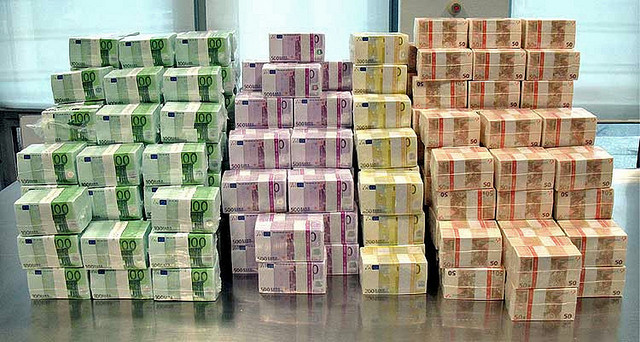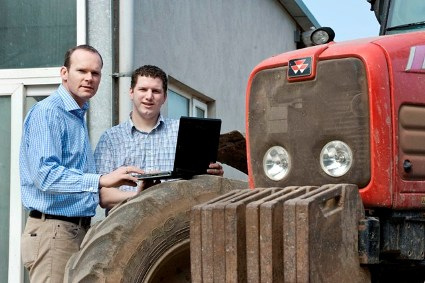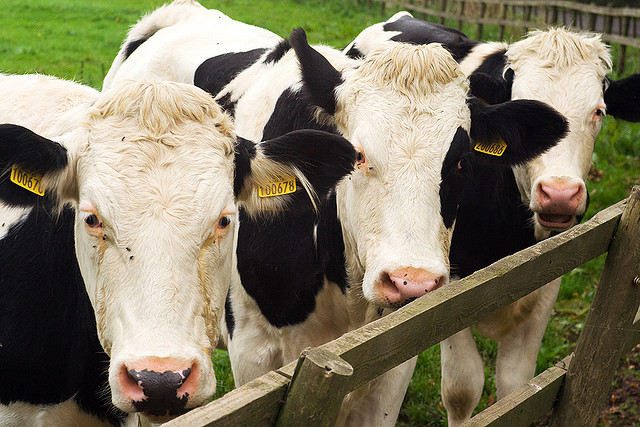Last week I participated in a session on the state of the CAP reform negotiations at the annual conference of the Italian Association of Agricultural and Applied Economics in Parma.
There were four presentations in the session, including an overview of the state of play in the negotiations by Giovanni Anania; a review of the CAP greening proposals by Jean-Christophe Bureau; an examination of the proposed changes in the rural development regulation by Francesco Mantino; and a discussion of how co-decision is influencing the outcome of these negotiations by myself.
Because the presentations might be of more general interest, with the permission of the presenters I plan to link to them over the next few days.… Read the rest
Wasting money on young farmers?
This post first appeared in the IIEA EnvironmentNexus blog.
One of the issues on the CAP reform agenda discussed at the last Agricultural Council meeting was whether the proposed young farmers’ payment in Pillar 1 should be a voluntary option for member states or not. The Council is arguing for a voluntary payment. Both the Commission and Parliament argue, on the contrary, that the payment should be mandatory.
Making this a mandatory payment could imply a three- to four-fold increase in CAP expenditure on young farmers. One might assume that such a substantial increase in expenditure would be justified by well-founded evidence of substantial gains in either generational renewal or farm productivity.… Read the rest
Challenges of implementing networking and governance mechanisms in the EIP
This guest post is written by Doris Marquardt, Senior Researcher at the Institute for Regional Development and Location Management, EURAC, Bolzano, Italy.
The setting-up of the European Innovation Partnership (EIP) ‘Agricultural Productivity and Sustainability’ as a new instrument under the rural development pillar in the next funding period has – in comparison to other elements in this CAP reform – so far not been the subject of contentious debate.
According to the draft regulation, the EIP is seen as a driver for innovation in the primary and food sectors. Added-value creation is expected by linking researchers and practitioners, promoting the transfer of new approaches into practice, informing the science community about research needs that matter “on the ground”, and by focussing existing policies on innovation.… Read the rest
EU to ban reusable olive oil bottles in restaurants
Olive oil marketing regulations are at the centre of a political storm in the UK following newspaper reports that the EU Commission proposes to ban the use of olive oil jugs and dipping bowls in restaurants from 1 January 2014 (see, for example, the Daily Telegraph and Guardian reports).
The proposal is reminiscent of EU rules preventing the sale of crooked cucumbers (repealed in 2009). Apart from the substantive issues around the merits or otherwise of the proposal itself, the issue throws light on the working of the EU’s comitology system as well as raising questions about the balance between maintaining uniform conditions of competition within the EU while also respecting the principle of subsidiarity.… Read the rest
A race against time
Two important meetings as part of the process of agreeing a CAP reform took place earlier this week – the Agricultural Council on Monday and the Ecofin Council on Tuesday. The Agricultural Council meeting was notable for the success of the Irish Presidency in getting agreement on a compromise mandate on the Common Fisheries Policy reform after 36 hours of negotiations which it is hoped will be the basis for a political agreement with the Parliament before the end of the Irish Presidency in June.
We are not yet at the same point with the CAP reform dossier (see this recent update to the Irish Parliament by Simon Coveney, the Irish Minister representing the Council in the trilogue negotiations and this view from Mairead McGuinness, one of the shadow rapporteurs in the European Parliament).… Read the rest
A short bibliography on CAP greening
As this was a relatively quiet week for news on CAP reform, I thought it might be useful to gather together in one place some references to the debate that has taken place on CAP greening since the publication of the Commission’s proposals in October 2011. This remains one of the knottiest issues to resolve in the CAP trilogues. These papers provide a guide to the general issues in this debate. There is also an emerging literature which attempts to estimate the impact for particular regions and farming systems of implementing the greening measures which I do not cover here. The papers are presented in rough chronological order and include a number of my own contributions so there is a certain amount of repetition.… Read the rest
MFF negotiations blown off course as European Parliament plays poker
Last week (Monday 22 April) the General Affairs Council (GAC) gave ‘guidance’ to the Irish Presidency for the negotiations with the European Parliament on concluding the MFF negotiations. The Irish Presidency’s objective is to reach agreement with the Parliament on the MFF by the end of June and to translate the overall MFF agreement into legal texts.
According to the conclusions of the meeting:
… Read the restMinisters supported the presidency’s efforts to find a compromise with the European Parliament on the next MFF in a timely manner. Ministers expressed their willingness to discuss the four key elements of the European Parliament’s resolution (flexibility, revision, own resources and unity of the budget).
What farmers should do to qualify for the new CAP green payment
This post originally appeared on the Environment Nexus website.
The trilogue process between the Council, the Parliament and the Commission on the new CAP regulations has now started. Over thirty meetings are scheduled to take place between now and end-June with a view to reaching a political agreement on the four main CAP regulations proposed by the Commission (direct payments, rural development, the single CMO, and the horizontal regulation).
The proposed greening of Pillar 1 payments is one of the key elements in the direct payments regulation. In their responses to the Commission’s proposal both the Council and the Parliament have moved to dilute considerably the impact of the three greening measures proposed by the Commission.… Read the rest
CAP reform uncertainty and the market for entitlements
One little-emphasised feature of the current negotiations on CAP reform is that the rules for eligibility for payments under the new basic payment scheme (and thus also the other proposed layers of Pillar 1 direct payments such as the green payment, young farmer’s payment, area of natural constraints payment and redistributive payment where these are adopted) are in a state of flux. New amendments and modifications continue to be introduced at successive stages of the negotiation process. This uncertainty is reflected in the market for Single Farm Payment (SFP) entitlements and the prices farmers are willing to pay for entitlements where they become available.… Read the rest
Impact of CAP subsidies on productivity
I recently had an exchange on Twitter with Martin Crowe, an Irish dairy farmer and agri-consultant, over the apparent stagnation in Irish agricultural output over the past 20 years (follow on @xAlan_Matthews and @martincrowe). I attributed this, in part, to the role that direct payments play in Irish farm incomes. I argued that “If 70% of your income is coming as a cheque in post there is less incentive to innovate to grow the remaining 30%” (direct payments make up around 70% of Irish farm income in an average year). Martin tweeted back that the “70% gives the security and confidence to try and improve the 30%”.… Read the rest






